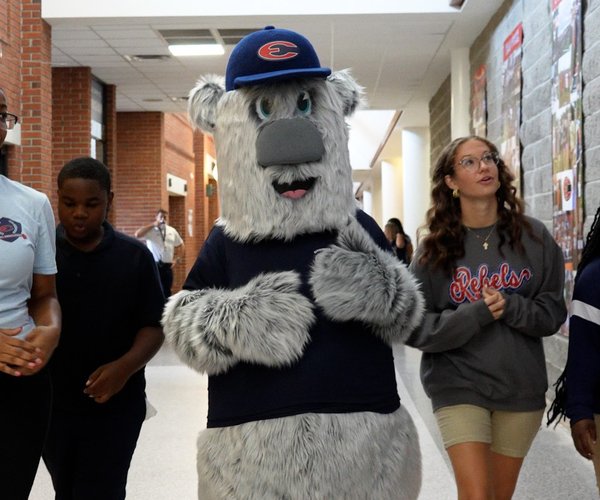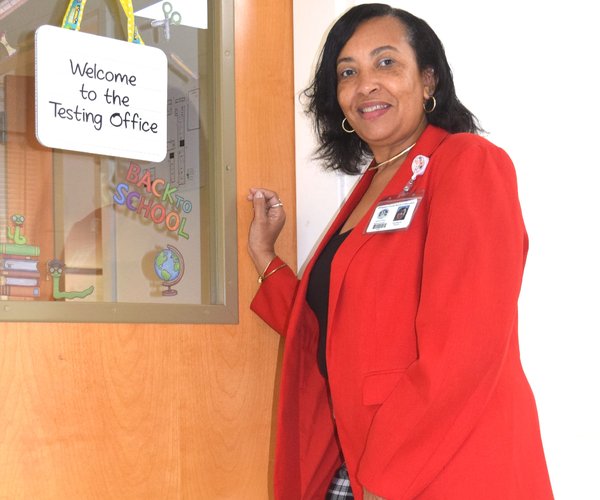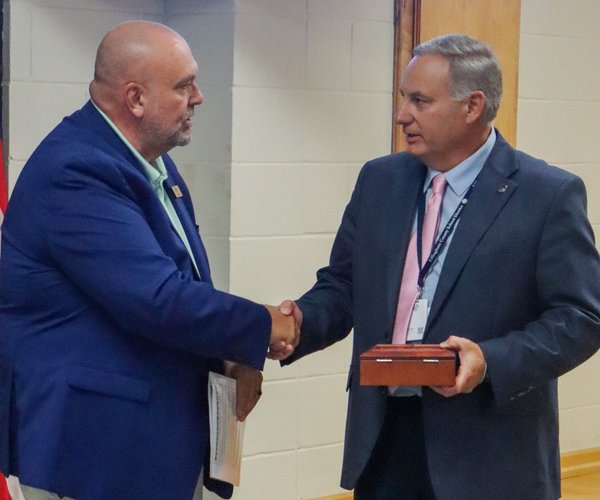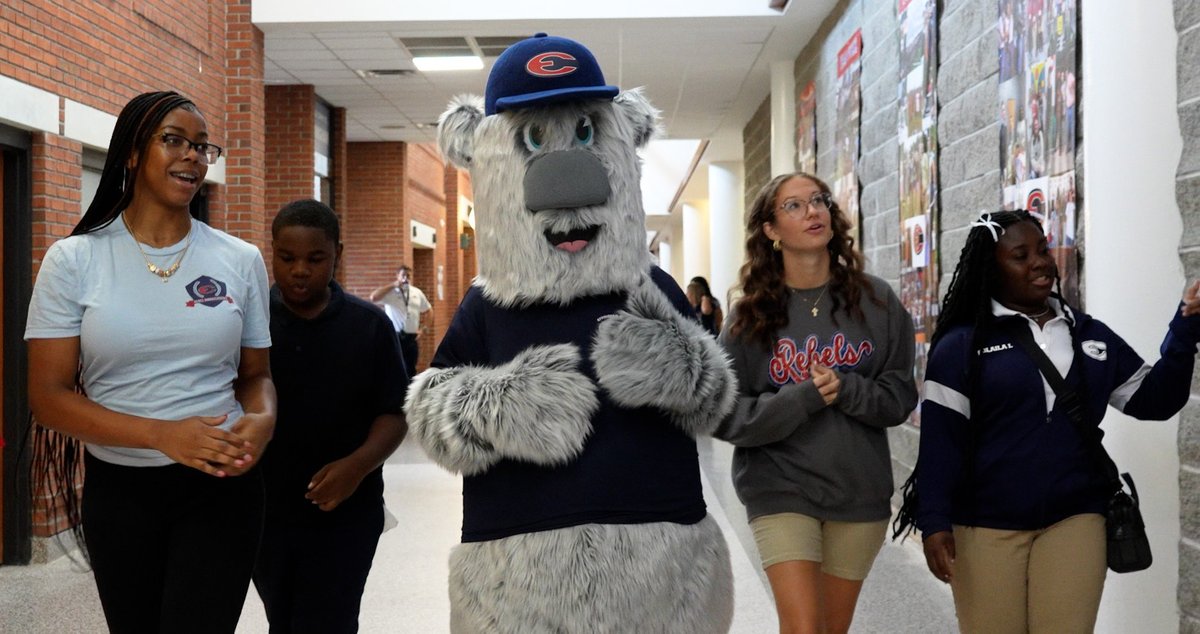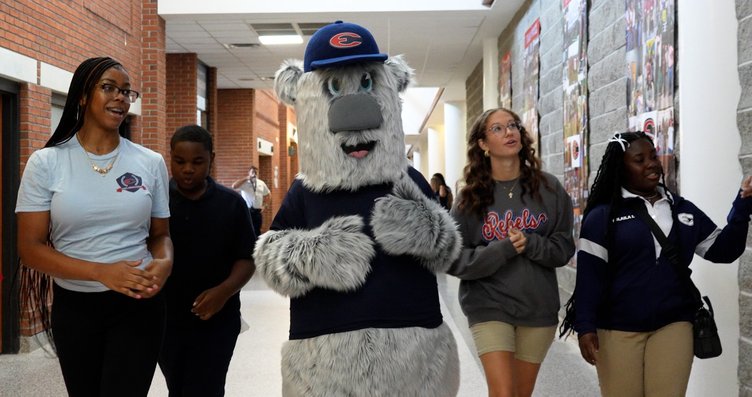STATESBORO — Turning the page from the expansion of Paulson Stadium to seat more than 21,000 people, the Eagles’ move into the Sun Belt Conference and a $13.5 million marketing deal with Coca-Cola, Georgia Southern University President Brooks Keel outlined what the university wants to write in its next chapter.
“Twenty-first century learning is going to have a very different flavor to it,” he said during his State of the University Address. “One of the things we’re going to be doing is trying to find areas in which the state needs folks trained and educated.”
Keel gave the informal speech, complete with slideshow, Wednesday morning during fall convocation, attended by more than 800 of the university’s 2,537 faculty and staff at the Performing Arts Center. “Writing Our Next Chapter” was the theme for the ceremony, which launches the academic year. Classes began Monday.
Keel mentioned manufacturing engineering and digital media as two directions for future growth. Manufacturing, he said, is coming back to the United States and to the Southeast in particular.
“We have just now submitted a proposal to the Board of Regents to allow us to offer a bachelor of science degree in manufacturing engineering,” Keel said. “To put things in perspective, there are only 25 programs in the country that have even been accredited. There’s nothing in the whole southeastern United States.”
The nearest programs currently are in Virginia and Texas.
Digital media, Keel said, “has broad implications. It goes well beyond computer science. It’s electrical engineering. … There’s writing and linguistics. When you start talking about video game developers, those folks have to have scripts. It’s all about art; it’s music; it’s theater.”
He mentioned the recently built Pinewood Atlanta Studios, which have some of the largest sound stages in America.
“Georgia is going to become the Hollywood of the 21st century,” Keel said.
Recent history
Before launching into the future, Keel highlighted recent news. The tiers adding 6,300 seats to Paulson Stadium were in use for spring graduation, attended by about 25,000 people. The new football operations center had a ribbon cutting Saturday.
Keel’s assigning a $13.5 million total value to the 10-year, exclusive marketing agreement with Coca-Cola was new since the July 31 contract announcement, in which he said only that the agreement was worth “multiple millions” and that it would be 10 times the value of the previous deal with Coke.
Wednesday, Keel’s PowerPoint slide noted that $6 million of the money will go to scholarships. It is the largest deal of its kind in the university’s history.
The move up to the Sun Belt and the NCAA Football Bowl Subdivision became official July 1. Two home games during the Eagles’ first season, those against Appalachian State on Sept. 25 and Troy on Oct. 30, will be televised by ESPNU.
“For a football program in its first year in the FBS to get two nationally televised football games, at home, is absolutely unheard of,” Keel said.
He called the potential exposure to 75 million households “a game changer” for the value of the university’s brand and casually mentioned that the university is working on deals with a variety of other companies beyond Coca-Cola.
“Athletics is the front porch of this university,” Keel said. “It gets people up on the front porch. They look in the picture window and see all of the other wonderful things that we’re doing at the university. When we have a 30-second spot on ESPN in front of 75 million TV sets, we’re going to be talking about the wonderful academic things that this university does.”
Current projects
One academics-driven building project he mentioned was the gutting and renovation of Sanford Hall, a former dorm, to become the new home of the Communication Arts Department. A ribbon cutting is slated for Aug. 21.
The shooting sports center, now under construction, will accommodate both firearms competition and archery.
Downtown, a $1.1 million U.S. Economic Development Administration grant is being used to expand the university’s City Campus to include a “business incubator,” with classrooms and equipment for creating new products.
Just this week, the university announced that its Allen E. Paulson College of Engineering and Information Technology has been fully accredited by the Accreditation Board of Engineering and Technology. After offering engineering technology courses for many years, Georgia Southern received University System of Georgia approval and launched its bachelor’s degrees in engineering in 2011.
“Our engineering program now has accreditation from ABET in civil, electrical and mechanical engineering,” Keel said. “This is a huge deal for Georgia Southern, for our students and for this community, especially South Georgia.”
Other new developments as Georgia Southern enters its 2014–15 academic year include a complete ban on tobacco use on campus, the first pay raise for most employees in six years and an approaching self-study to maintain the university’s regional accreditation by the Southern Association of Colleges and Schools-Commission on Colleges.
Patricia Humphrey, moderator of the GSU Faculty Senate, mentioned the raises, for which the university supplemented the state-funded amount, during her remarks. Other speakers included Kendria Lee from the Staff Council, which represents nonteaching employees, and Student Government Association President Azell Francis.
“This was one of the better convocations I’ve been to,” said Richard Flynn, a professor in the literature and philosophy department.
His spouse, Rebecca Kennerly, an assistant professor from the Communication Arts Department, called the presentation “informative and inspiring.”


